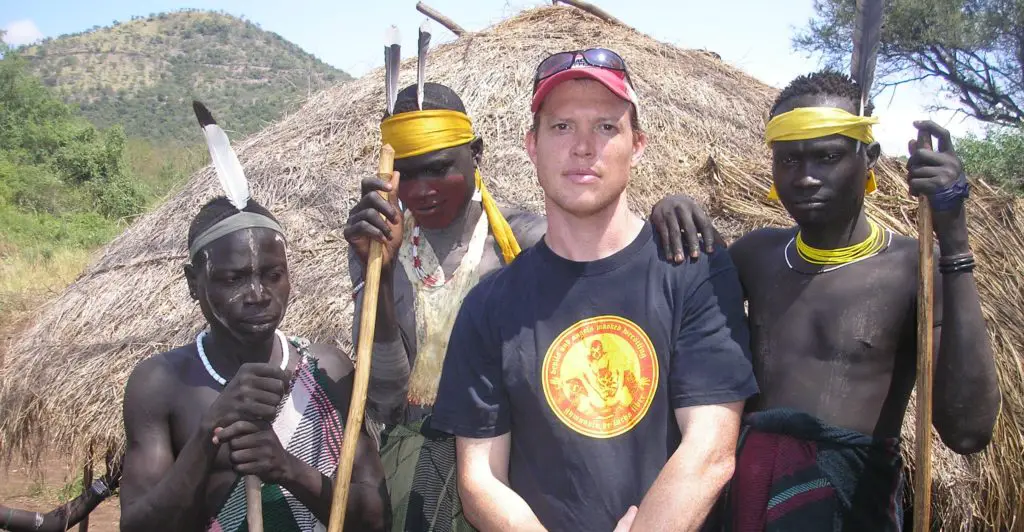Rolf Potts is world traveler and writer who has reported from more than sixty countries. He is a veteran travel columnist for Salon.com and he is probably best known for his book promoting travel, Vagabonding: An Uncommon Guide to the Art of Long-Term World Travel. Rolf has been an inspiration for this site and thousands of travelers worldwide. When I read Vagabonding it completely changed my views and goals for traveling. Recently, I had the opportunity to ask him a few questions about his life as a traveler and to share his experiences with us.
What is your first travel memory?
I have a very vivid memory of going to Colorado from Kansas at age
six. I remember how excited I was to see mountains for the first time,
and how the instant my father pulled over the car once we were in the
mountains, I shot out of the back seat and just started running around
through these strange new rocks and landscape contours. I still like
going back to Colorado, and the smell of a ponderosa pine puts me
right back into that six-year-old joyfulness. I can recall having gone
on small trips in Kansas before that, but that was my first encounter
with what you might call (or what felt to me at the time as) the
“exotic.”
If you only had one month of travel time to explore new places this
year would it be in one country or across many?
I would definitely stay in one country, since there is so much more
value in getting to know a single place well than in ticking a bunch
of places and sights off a list. I think as Americans have a
compulsion to micromanage our travels like we micromanage their lives
back home, and that’s why we try to cram a bunch of places into a
single trip. You might see more places that way, but by the time you
get home you’ve “experienced” less. The month I spent in Havana in
2007 is far more memorable than the month when I packed in eight Latin
American countries a few years earlier. Collecting new friends and
deeper understandings in a single place is more valuable to me on the
road than collecting new passport stamps.
What is the best way to experience a culture without actually moving there?
There is no substitute for experiencing a culture first-hand. These
days we have so many technologies and online resources that faraway
places can at times feel familiar, but there’s no substitute for going
to a place, smelling its air, getting lost in its back-alleys.
Firsthand experience also teaches you that culture is not something
you can understand in an intellectualized way. To experience a culture
you have to go there and make yourself vulnerable. I learned more
about Korea at an intuitive level during my two years of living there
than I could possibly explain to anyone. I tell people that if you
want to really understand Korea, you have to go there yourself, settle
in for a while, make some mistakes, make some friends. That can apply
to any culture — including far-flung places and subcultures in your
home country.
How important is it to learn another language?
Learning another language is incredibly useful, and an essential way
to engage yourself in another culture. That said, I’ve been traveling
for years without ever becoming fluent in a second language. I have at
various points spoken passable Korean and Spanish — and I know bits
of Thai, Lao, Russian, Arabic, French, Greek — but I’ve never
mastered another language. Someday I hope to correct that. But in the
meantime I can serve as a great example of someone who has done a lot
of travel without mastering languages. I’m proof that one can travel
to far flung part of the globe and have engaged experiences using
simple English, improvised sign language, a few phrases of the local
tongue, and a lot of patience, optimism, and good will.
What is the most important thing someone should takeaway from traveling?
I think it’s personal — and it’s something that changes with time. In
my early twenties I was content to see some new places, gain some new
understandings, and have a fun time. As I’ve gotten older it’s become
more about slowing down and trying to understand a place in a
counterintuitive way. In general, the best reward of travel in the
21st century is the chance to experience other places and cultures in
an unmediated way — to get past the mediated, online virtual world
that commands so much of our attention at home and live and in an
open-hearted, open-minded, unplugged manner. That’s a mindset you can
take home with you, too.
Biography
Rolf Potts has reported from more than sixty countries for the likes of National Geographic Traveler, The New Yorker, Slate.com, Outside, the New York Times Magazine, The Believer, The Guardian (U.K.), National Public Radio, and the Travel Channel. A veteran travel columnist for the likes of Salon.com and World Hum, his adventures have taken him across six continents, and include piloting a fishing boat 900 miles down the Laotian Mekong, hitchhiking across Eastern Europe, traversing Israel on foot, bicycling across Burma, driving a Land Rover across South America, and traveling around the world for six weeks with no luggage or bags of any kind.
Check out his sites RolfPotts.com and Vagablogging.net to find out more about Rolf.
Rolf’s Books
Vagabonding (one of my favorite books of all time)



Pingback: Intrepid Dinner Guests | Small World This Is()